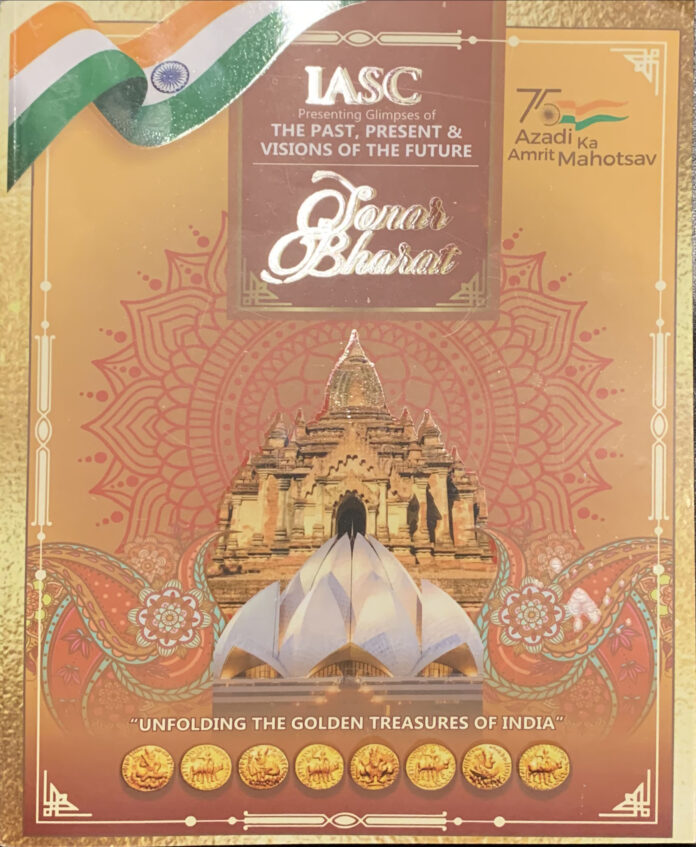Riyaz Khan
India Post News Service
Kamini Khare, born and raised in Kanpur, Uttar Pradesh, comes from a family deeply rooted in education. Holding a master’s degree in economics, with her thesis dedicated to the development of India, she has long nurtured a passion for history and cultural heritage. Living in the United States, Ms. Khare became increasingly aware that many young people of Indian origin were only partially familiar with India’s historical legacy. This awareness led her to reflect upon the need to illuminate India’s past—not only as a record of struggle and sacrifice but also as a testimony to resilience and achievement.
Her recently published book, Sonar Bharat, represents this endeavor. The book highlights India’s journey since its independence 75 years ago, celebrating its resilience and growth. Drawing upon historical texts, archival materials, and digital resources, Ms. Khare revisits India’s civilizational journey from the era of Chandragupta Maurya, often described as India’s “Golden Age,” through the succession of rulers who made the subcontinent known as the “Sone Ki Chidiya” (Golden Bird) of Asia. She also examines the profound impact of successive invasions that transformed India’s cultural and economic landscape, while underscoring the nation’s enduring vitality and capacity for renewal.
 In narrating India’s struggle under colonial rule, Ms. Khare does not overlook its darkest chapters. The Jallianwala Bagh massacre of April 13, 1919—when hundreds of unarmed civilians were killed under the command of General R.E.H. Dyer—stands as a stark reminder of the brutality of imperial oppression. Equally, the Bengal famine of 1943, which claimed the lives of millions, revealed the devastating consequences of exploitative policies that left the populace vulnerable and destitute. These episodes, alongside the countless sacrifices of freedom fighters, form the backdrop against which India’s independence was finally realized in 1947.
In narrating India’s struggle under colonial rule, Ms. Khare does not overlook its darkest chapters. The Jallianwala Bagh massacre of April 13, 1919—when hundreds of unarmed civilians were killed under the command of General R.E.H. Dyer—stands as a stark reminder of the brutality of imperial oppression. Equally, the Bengal famine of 1943, which claimed the lives of millions, revealed the devastating consequences of exploitative policies that left the populace vulnerable and destitute. These episodes, alongside the countless sacrifices of freedom fighters, form the backdrop against which India’s independence was finally realized in 1947.
Sonar Bharat is more than a historical survey; it is a cultural meditation on India’s post-independence trajectory. Seventy-five years after freedom from colonial rule, Ms. Khare emphasizes the necessity of recognizing both the intellectual and material contributions of India’s leaders and citizens in shaping a modern nation. Equally, she urges renewed attention to rural development, which she regards as the backbone of India’s future. In this respect, her work aligns with the vision of Mahatma Gandhi, who declared in Young India (October 1921): “If the village perishes, India will perish too.” Ms. Khare identifies three essential components for sustainable rural development: small-scale industries, accessible secondary education, and reliable healthcare.
Published by the Indian Association of Southern California (IASC), Sonar Bharat reflects a collaborative spirit, enriched by community dialogue and constructive critique. It aspires not only to preserve memory but also to provoke reflection on the pathways of cultural continuity and social transformation in India.
Copies of the book are currently available through the author. Interested readers may contact
Sonar Bharat a book- Published by Ms. Kamini Khare
Ms. Kamini Khare at 714-280-3774 or via email at kaminikhare7@gmail.com.







